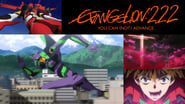VeteranLight
I don't have all the words right now but this film is a work of art.
Salubfoto
It's an amazing and heartbreaking story.
Tymon Sutton
The acting is good, and the firecracker script has some excellent ideas.
Matho
The biggest problem with this movie is it’s a little better than you think it might be, which somehow makes it worse. As in, it takes itself a bit too seriously, which makes most of the movie feel kind of dull.
Ucare
I did not watch the original 26 episodes series but I watched in these days all Evangelion films, because of the high ratings: Death and Rebirth (a recompilation of the original series), The End (a rewriting of the End of the series, still considered one of the best Anime ever), and then the last three, 1 and 2 which reboot the series apparently without mayor changes, and 3 which goes in new territories. At first I will write about Evangelion in general, and then about this specific movie here. In all Evangelion the writer touched any possible demagogic stereotype and cliché on earth: father/son relationship, Oedipus complex, a bit of the typical Manga Style sexuality, cheap psychology, and a huge amount of very cheap esoterism with symbolisms of all kind. My opinion? A big omelet of everything, which finally means absolutely nothing. Wiki says that after the failure of his previous works (which he judged as childish) he wanted to make something "deeper". My impression is that he did not even try to BE deeper, rather just to SEEM deeper in order to impress the audience. And I am afraid that only the Naive could be impressed by such a confused mess.I can still see why this show had success: Evas are cool, fights too, and there is enough mix of drama, action, teenage nerd sexuality in the typical Japanese style, and some sort of epic. I suppose that if you are younger than me and without any knowledge of psychology or esoterism, and a bit nerd, you may enjoy this works pretty much more than I did.About this film: like the number 1, it is almost a copy and paste of the series, but this time with some more changes, which, as another reviewer said, I also find good, giving more action and some more credible psychology, and less of the biblical potpourri which the author should make eternal amend for (being really stupid and pretentious). If you enjoyed the series and/or the recompilation and/or the number one, you will surely enjoy this movie. I loved the end, being myself a terrible romantic. Even if then the number 3 completely ruined everything.
mmushrm
First let me state that I was not a fan of the Neo Genisis Evangelion series. I found the main character's constant self pitying weak and annoying. Hence I couldn't connect with the character which of course affected the story and the philosophy behind the story. Out of boredom I decided to watch the rebuilds 1.0 and 2.0 (this a review for both). The rebuilds basically takes story archs from the series to make into a new movie with some new graphics, new characters and new story arch. I found the new graphics and the new story arch very interesting as its faster pace and of course with new graphics. It also left out a lot of Shinji's self pitying patheticness which allowed me to actually connect with the story instead of trying not to throw up with disgust. The battle scenes are superb. I cant wait for rebuild 3.0 and 4.0
otaking241
I have to admit that, after the first film in this new 'Rebuild of Evangelion' cycle, I had extremely low expectations for the second film. 1.11 was such a carbon copy of the 1995 series that I was convinced that Anno and the crew at Gainax were content to simply cash in on remaining fan fervor and release a mildly rehashed version of that admittedly brilliant storyline.The first 10 minutes of 2.22 utterly destroyed this preconception and left me breathless in my seat. This is one of the most fantastic opening sequences I've seen in film and sets the stage for a thrilling experience. 'You Can (Not) Advance' opens with the introduction of a new character, a new EVA, a new Angel, and a new scenario, and proceeds to evolve the storyline in a completely unpredictable fashion.People who think they 'know' Eva are going to be knocked on their asses by this film. Nearly everything has been upgraded for the better: from the stunning visuals to the revamped plot line to the compelling musical score (Shiroh Sagisu at the absolute pinnacle of his game). It's breathless and fast-paced and a very compelling movie experience.Which brings me to my one big gripe about the film: it may be a little TOO entertaining. The original TV series was filled with tortuous self-doubt and self-loathing, an introspective psychoanalytical and quasi-religious experience set to the background of giant robot combat for human survival. The new films streamline this so much (seemingly for the sake of watch-ability) that they lose a key part of what really made the series so engrossing, at least for longtime fans like myself.To give one big example: Shinji's ambiguous relationship with the 3 women in his life (Misato, Asuka and Rei) is a huge aspect of the original series. He is continuously torn apart by his mix of adolescent sexual desire, desire for friendship, and desire for a mother-figure with regards to each of them. This is an underlying current throughout the series and becomes a real driving force in the original theatrical climax ('Air' and 'My Pure Heart for You'). In the 'Rebuild' storyline, this is re-imagined as a much simpler developing romance between Shinji and Rei, with Asuka's one-sided affections filling out a rudimentary triangle (her character in the new film is such a 180 that it's difficult to accept). While much easier to understand and certainly less angst-ridden, I do find this resort to a familiar trope to be a bit of a disappointment, especially when compared with the original storyline.In spite of these minor quibbles, this is a film that really must be seen by anyone who has even a passing interest in Japanese animation or film in general, and if possible you should try and catch it during its US theatrical run in January. Just don't take this as the 'definitive' Eva.
db215
I watched Evangelion as a teenager and liked many aspects of it. However the series was very weak and repetitive in the middle and clearly suffered production difficulties near the end. The movies didn't do much for me after the initial epic-scope aesthetics of End of Evangelion had worn off. Now more than 10 years later I'm pretty happy that things have been reordered and re-rendered to make the series into what it should really have been in the first place.I don't like the fact than Anno Hideaki has been able to milk the somewhat unfinished series for so much cash and so many editions (not to mention pachinko machines) so far, but taking 1.0 and 2.0 as stand-alone works (and ignoring their pretentious titles) is pretty satisfying.Story 8/10 Good: much more than a rehash of the series. The story is fleshed out in some of the most necessary places and feels so much tighter and more concentrated than anything that has come before. Some awesome new snippets of what is to come later in the series add some satisfying excitement.However, there is still an element of "here comes the next baddie" which gets a little tiresome. It is dealt with much more effectively here than the series, but it's still predictable. Nevertheless, despite giving the impression of being about to enter the full-on "monster of the week" barrage, it never really does, which is a blessed relief. The interactions of the characters are becoming more believable, and individual personalities are being better exposed and explained.But, and it's a necessary but, what's the deal with the fan-service? Come on, man. Take yourself seriously, won't you? Animation 9/10 Well, it teetered between absolutely superb and a little disappointing. The budget was clearly insanely high. Action sequences are fantastically detailed and choreographed for the main part, although suffer from gratuitous flailing of limbs and ridiculous acrobats which unfortunately dumb it down a little. Backgrounds are simply amazing. The detail and range is incredible. The failings lie in the characters. Sometimes character faces and expressions look out of place by their simplicity. The broad pen pines and over-simple shading are a bit of a let-down.Sound 7.5/10 Not particularly amazing. Again we see the technique of using a mixture of classical and children's music for depth and vulnerability. I'm surprised at some of the choices though. For example, one of the children's songs used is very popular in Japan and often used in elementary schools. The manner in which it is normally used makes its appearance in the film almost comical; which can't have been the intention. Not really knowing many Japanese people who care that much about anime I haven't been able to ask what they though, but it seemed a bit silly to me.The Japanese people speaking English throughout the film are incredibly embarrassing. What a huge mis-calculation. How hard is it to train people to say a small number of lines in a natural way? Characters 8.5 Although some of the characters (particularly Asuka) seem to have become even less likable, for the most part the big-hitters have only improved. Although there is little time left for the minor-characters to develop or even really be involved, the well-developed personalities of the leads take somewhat new directions in their relations to one another. The relationship between teen-sap Shinji and his father has a more satisfying and somewhat relatable edge to it now, and Rei's annoyingly hyperbolic meekness has been flatted out to something more forgiving. All in all, satisfying.And the new lead, Mari, is much better than (at least I) predicted. She has a very interesting relationship with herself, and pain. I am definitely looking forward to her future development.Eva designs seem to have changed slightly around the waist which was a curious choice, and doesn't add much to their attractiveness. In contrast, the Angels have been changed for the better. The old, sometimes Ultraman-ish designs were sometimes a little... Ultraman-ish. The reduced number and better designs have helped things along well.Overall 8.5/10 Overall satisfying. For me the film didn't quite have the intensity ascribed to it by others, and the ending I thought actually lacked a little emotional attachment. I also thought that the amazing animation and choreography discussed above wasn't nearly as good near the end as it was earlier in the feature. But despite this, as a whole this movie blows the series out of the water. So much which was unsatisfactory is now shiny and new. Whether or not I would feel this way about the film without having seen the rest of the franchise is anyone's guess, but I really enjoyed it. Good work, keep it up.







